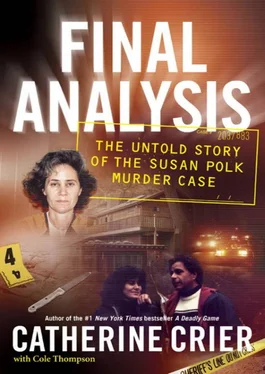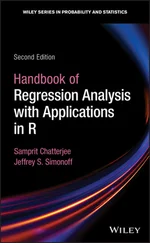As an image of Susan flashed onto the television screen, sobs could be heard from the defendant—emotional at the sight of herself in the interrogation room. She was dressed in a pair of shorts and a polo shirt; an official police jacket was draped over her shoulders. The jury could not see her at the counsel table, but they could hear her whimpers, which grew louder as the videotape played on. She was so upset that her case manager, Valerie Harris, slid a box of Kleenex in front of her.
“Do you want to talk to me about what happened?” Costa’s voice boomed from the TV monitor.
“I do, and I am very, very tired,” Susan responded. She appeared toned and at least ten pounds heavier in the videotape and her hair was styled and neat—nothing like the overgrown, bushy mop that she wore to court each day.
“So am I. I haven’t been to bed all day either, but we have to do this.”
Susan wore a puzzled look, “What did happen?”
“Well, that’s what I’m hoping you can tell me.”
For the next two hours, Susan repeatedly denied any involvement in her husband’s death, even as the detective presented evidence to the contrary.
In the courtroom, Susan managed to quiet down and now sat beside Valerie wiping tears as jurors listened carefully to the interrogation tape.
“And you don’t know what happened to your husband?” Detective Costa asked for a second time.
“No.”
“Something happened, obviously. That’s why we’re all here. That’s why you’re here. You’ve had ongoing marital problems for sometime now, living in different places, money difficulties. So something happened, Susan.”
“That doesn’t mean that I killed him.”
“Was he seeing any other ladies?”
“I don’ t even know that he’s dead,” Susan replied. “All I know is I was lying in my bed reading and I heard Gabe get on the phone and ask to speak to a police officer, so I got out of bed and asked him ‘What’s wrong?’ He accused me of having…killed his dad.
“I did not kill my husband,” Susan insisted. “I am not that kind of person.”
Jurors listened to Susan dance around the detective’s questions, spending an inordinate amount of time detailing the couple’s financial woes and how Felix had terrorized her during their marriage. Finally, she told Costa about the call she received from her husband while in Montana, alerting her to a judge’s ruling to cut her spousal support and award Felix custody of their minor son. “And I said, ‘Are you kidding?’”
Her reaction to the phone call was crucial to the state’s case. Prosecutors claimed that the conversation triggered Susan’s murderous rage, prompting her return to California and killing her husband. The videotaped interrogation was intended to demonstrate how she initially denied any role in the homicide—an outright lie.
On the stand, Detective Costa reported that his investigators had confiscated a number of incriminating items during their search of the Miner Road crime scene, including Susan’s computer, which contained her diary and the knife with “red dried stuff” on its tip. Although that knife would not match Felix’s stab wounds, the prosecution tried to show that investigators had come away from the Miner Road home with physical evidence that could be used against Susan.
During his testimony, Susan demanded that Costa be reprimanded for conversing with a juror while seated in the witness box. According to Susan, her case manager, Valerie Harris, had witnessed the exchange and Susan wanted the detective admonished.
Out of earshot of the panel, Costa admitted to Judge Brady that he had inquired about the climate in the courtroom. “Is it me, or is it warm in here?” he had asked the juror seated closest to him in the jury box.
“Don’t talk to the jurors,” Brady instructed. “You know better.”
But Susan couldn’t leave well enough alone. “Are you acquainted with courtroom decorum?” she asked the detective once jurors had returned to their seats.
Brady immediately reprimanded Susan for improperly raising the subject in front of the panel.
Despite her lack of experience in the courtroom, Susan did a commendable job of cross-examining Costa about his investigation. Her first line of inquiry focused on whether police had looked into her claims of spousal abuse.
When the detective replied that they had not, Susan went after him.
“It was a murder investigation, wasn’t it?” she asked derisively.
“Yes,” the detective agreed.
“And you didn’t check any of these things out?” Susan demanded.
“Not personally.”
“Did anybody?” Susan asked, firing off questions like a veteran lawyer. “Yes or no?”
“Not to my knowledge,” Costa replied.
“Were there any individual sources, not from the defendant’s mouth or pen, that you came across that gave you a domestic violence background?”
“No.”
“Not even Eli?” Susan asked, referring to her middle son.
Costa said he hadn’t heard any accusations, not even from Eli.
Susan criticized the detective for not conducting more interviews with her son. She also raised questions as to why police had only confiscated some of the knives from her kitchen and not others. She even got Costa to concede that approximately thirty law enforcement officers had “trampled” around Felix’s body that first night.
“That could be—not all at once I assume,” Costa said.
Susan also elicited admissions from the detective regarding Felix’s computer. Costa told the court that his officers found only the monitor and the keyboard in the trunk of Felix’s Saab. Susan suggested that her husband’s computer might have contained evidence to support her claims of spousal abuse. She also noted that police had not interviewed her eldest son, Adam, until October 2005, just days before her first, aborted murder trial got underway.
For all the salient points, Susan suddenly lost momentum when she veered into an outlandish inquiry that put her own mental stability in question. It was a pattern throughout the trial that repeatedly overshadowed her productive moments.
“Didn’t I accuse my husband of being a Mossad agent?” she asked, referring to an entry in her computer diary. “Did you follow up on that at all?”
The detective said he had not.
Susan next pointed to her written claim that Felix had betrayed his country by failing to turn over information provided to him about the September 11 terrorist attacks. Susan later admitted that she gave that information to her husband while under hypnosis and in a trance.
“Did you report it to the FBI?” Susan asked Costa.
“Not to my knowledge.”
“Do you believe there is no such thing as the Mossad?”
“Do I believe? Yes, they exist.”
“Normally, if there is some kind of treasonable activity, doesn’t that get reported?”
“Yes.”
“Are you aware that my husband believed he was a psychic?”
To raised eyebrows from jurors, Costa said he was not.
“Do you believe in psychic phenomenon?”
“No, not really.”
“No?” Susan was incredulous. “Are you aware that most Americans do?”
“No, I was not aware of that.”
“Did anybody tell you that I am supposed to be a medium?” she persisted.
Costa had not heard that, nor had his investigators looked into accusations that Felix intended to overthrow the U.S. government, as Susan claimed in her diary. This elicited jeers from the gallery. Still, Susan continued firing questions at the detective about her husband’s supposed anti-American activities. Claiming that two private investigators had looked into Felix’s dealings, she said that the pair had stumbled upon writings that detailed his plan to bring down the U.S. government and take over the country.
Читать дальше











